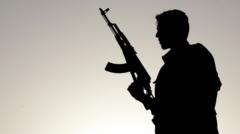Kurdish PKK has begun a disarmament process with a ceremonial destruction of weapons, signaling a potential end to a longstanding conflict with Turkey. Amid a history of violence that has claimed thousands of lives, the gesture aims to promote democratic dialogue.
Kurdish PKK Takes Historic Step Towards Peace with Turkey by Burning Weapons

Kurdish PKK Takes Historic Step Towards Peace with Turkey by Burning Weapons
The Kurdish PKK's symbolic disarmament marks a potential shift towards peace in Turkey after decades of conflict.
As a significant step in ending a decades-long conflict between the Kurdish PKK and the Turkish state, the outlawed Kurdish group's disarmament ceremony took place in a notable location in Iraqi Kurdistan. Approximately 30 PKK fighters, including notable leaders, voluntarily burned their weapons in a public display of goodwill. This event has been lauded by the Turkish government as a pivotal moment towards realizing a "terror-free Turkey."
The roots of the conflict date back to 1984, when the PKK began its armed struggle, initially seeking an independent Kurdish state within Turkey. Over the years, their goals shifted towards advocating for greater regional autonomy for the Kurdish population, now comprising roughly 20% of Turkey's citizens. The recent disarmament follows a history of failed peace attempts, including a ceasefire declared in 2013 and the Dolmabahce Agreement of 2015 aimed at promoting democratic rights for Kurds, which ultimately collapsed under renewed violence.
A crucial figure in this recent development is Abdullah Ocalan, the imprisoned leader of the PKK, whose calls for peaceful negotiation have provided air to this renewed effort. After years of confinement, Ocalan's recent appeals to disband the PKK and embrace democratic processes have received attention both domestically and internationally. Not only does he retain significant influence among Kurdish communities, but his statements have contributed to the marked shift towards disarmament.
While the disarmament process is anticipated to unfold throughout the summer, it also poses questions for the Turkish parliament regarding future political agreements and the continuing fate of Ocalan. Notably, Turkish President Recep Tayyip Erdogan is positioned to benefit politically from this situation, as ongoing discussions about constitutional changes could yield him greater influence in his political career.
This movement towards peace highlights the fragility of the region's climate, with implications that extend beyond Turkey to neighboring nations like Iraq, Syria, and Iran, as stakeholders await the outcome of this significant disarmament initiative.
The roots of the conflict date back to 1984, when the PKK began its armed struggle, initially seeking an independent Kurdish state within Turkey. Over the years, their goals shifted towards advocating for greater regional autonomy for the Kurdish population, now comprising roughly 20% of Turkey's citizens. The recent disarmament follows a history of failed peace attempts, including a ceasefire declared in 2013 and the Dolmabahce Agreement of 2015 aimed at promoting democratic rights for Kurds, which ultimately collapsed under renewed violence.
A crucial figure in this recent development is Abdullah Ocalan, the imprisoned leader of the PKK, whose calls for peaceful negotiation have provided air to this renewed effort. After years of confinement, Ocalan's recent appeals to disband the PKK and embrace democratic processes have received attention both domestically and internationally. Not only does he retain significant influence among Kurdish communities, but his statements have contributed to the marked shift towards disarmament.
While the disarmament process is anticipated to unfold throughout the summer, it also poses questions for the Turkish parliament regarding future political agreements and the continuing fate of Ocalan. Notably, Turkish President Recep Tayyip Erdogan is positioned to benefit politically from this situation, as ongoing discussions about constitutional changes could yield him greater influence in his political career.
This movement towards peace highlights the fragility of the region's climate, with implications that extend beyond Turkey to neighboring nations like Iraq, Syria, and Iran, as stakeholders await the outcome of this significant disarmament initiative.



















